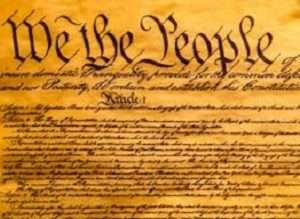The Volokh Conspiracy
Mostly law professors | Sometimes contrarian | Often libertarian | Always independent
Abortion, Marbury v. Madison, and What's "Written in the Constitution"
The oft-heard argument that something isn't "written in the Constitution" is not as compelling as it might seem. Sometimes, it's outright false.
Conservative critics of Roe v. Wade have long argued that it is wrong in part because the right to abortion is nowhere written in the Constitution. Thus, it's no surprise that the issue came up in today's oral argument in Dobbs v. Jackson Women's Health Organization, the case that could lead to the overruling of Roe. Supreme Court Justice Sonia Sotomayor offered the following response, while questioning Mississippi Solicitor General Scott Stewart:
Justice Sonia Sotomayor turned to Mississippi's arguments that Roe v. Wade should be overturned because abortion rights are not explicitly laid out in the text of the Constitution.
Sotomayor noted that several key decisions – such as Marbury v. Madison, which established the judicial review – are not in the Constitution, nor are decisions guaranteeing the right to birth control and same-sex marriage.
"I fear none of those things are written in the Constitution," Sotomayor said. "They have all, like Marbury v. Madison, been discerned from the nature of the Constitution."
Neither the initial argument nor Sotomayor's critique are as compelling as they might seem. It is true that a right to abortion is nowhere specifically mentioned in the Constitution. If it were, that would have made Roe and subsequent cases much easier to decide. But it doesn't necessarily follow that there is no constitutional right to abortion.
Some parts of the Constitution establish very clear and specific rules, such as that each state gets two senators, and that the president must be at least 35 years old. But many others state broad, general principles that courts must then apply to specific cases. The Constitution doesn't specifically establish a right to criticize the president in vitriolic terms. But it does include a general right protecting "freedom of speech," which courts can then readily apply to protect people who put up signs saying things like "Fuck Biden" and "Biden sucks."
Similarly, the case for a right to abortion comes down to whether that right falls within the scope of broadly phrased parts of the text, such as the "liberty" protected by the Due Process clauses of the Fifth and Fourteenth Amendments, or the "equal protection of the laws" (also part of the Fourteenth Amendment). Some defenders of Roe argue that a right to abortion is necessary to ensure "equal protection" for women.
For her part, Justice Sotomayor is wrong to suggest that judicial review isn't written in the Constitution, but must be inferred from its "nature." The idea that judicial review is an atextual power that was somehow invented by John Marshall in Marbury v. Madison is a longstanding trope. But it's wrong, nonetheless. Article III of the Constitution specifically states that "The judicial Power shall extend to all Cases, in Law and Equity, arising under this Constitution, the Laws of the United States, and Treaties made, or which shall be made, under their Authority."
The power to decide "all Cases… arising under this Constitution" necessarily includes the power to rule that state and federal laws violate the Constitution and therefore cannot be enforced. Judicial review was widely understood to exist long before Marbury, and that case was far from the first time federal courts invalidated a law because of its unconstitutionality. State courts also had a long history of judicial review, including pathbreaking decisions striking down slavery as a violation of the Massachusetts Constitution.
As for the other cases Sotomayor cites, they, like the argument for a right to abortion, are based on interpretations of broad, general rights guaranteed by the Constitution. For example, the right to same-sex marriage was grounded by the Court in a combination of the Due Process and Equal Protection clauses. In my view, it would have been better justified based on a more straightforward application of equal protection rules barring sex discrimination. But, either way, the case for that right relies on interpretation of broad textual guarantees of liberty and equality, not inferences from the inherent "nature" of the Constitution.
None of the above by itself determines whether the Constitution protects a right to abortion (an issue I will leave to others). But it can help clear away some of the underbrush of bad arguments surrounding the question. The issue cannot be resolved simply by pointing out that abortion isn't specifically mentioned in the Constitution, or by appealing to widely believed, but badly misguided myths about the origin of judicial review.



Show Comments (92)